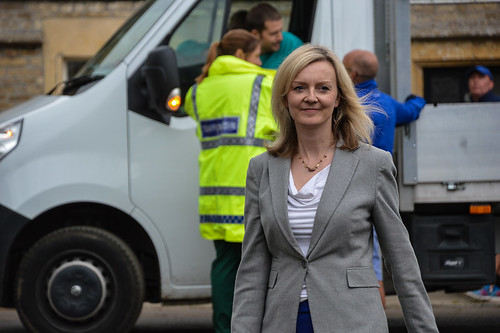Liz Truss Accused Of “Corbynite Toryism” And Disrupting Conservative Conference
Liz Truss #LizTruss

4 min read38 min
Former Prime Minister Liz Truss has been accused of “Corbynite Toryism” after a disruptive fringe event at Conservative Party Conference where she set out her stall on growth to hundreds of Tory Party activists.
Truss, who served in office for 49 days, told a packed-out room that the Government should cut taxes, reduce regulation, increase housebuilding and implement fracking.
Truss addressed the Great British Growth Rally event in Manchester on Monday, which also included speeches from three former cabinet ministers including Priti Patel, Jacob Rees Mogg, and Ranil Jayawardena.
Speaking to PoliticsHome at the event, one Conservative peer noted that opinion polls do not look good for the governing party, and suspected the fringe event looked like a host of potential leadership pitches from those hoping to replace Rishi Sunak as Tory leader if they lose the next election.
A Conservative source described Truss’s ideals as “Corbynite Toryism” arguing that the idea that there is widespread support for this politics like this in the country at large is “fanciful”.
But the long queues outside the event showed just how popular Truss remains with the party membership, if not the country and parliamentary party, despite her catastrophic stint as prime minister last year.
“People were queuing for literally 40 minutes to get in, it shows that there is still strength of feeling behind her,” Edward Todd, a Conservative member said.
Nigel Farage, former Brexit Party leader, who was at the event, told PoliticsHome he felt the Conservative Party was in a “rebellious mood”.
“There is a pretty rebellious mood in the air. It’s very unhappy. It’s an admission. That after 13 years, things are worse, not better in the country,” he added.
Farage said the Conservative Party was still split on the big issues such as Net Zero, Brexit and immigration.
“The real battle here is what happens after the next election. That’s what’s really going on, I think at this stage I would suggest it’s more a battle of ideas,” he said.
Rees Mogg told PoliticsHome he disagreed with the claim he was being rebellious. He said he thought the former cabinet ministers who attended the event were “loyal” and “supportive” people. He made it clear tax cuts should be implemented by the Chancellor before the next election.
“I think that things need to happen before the election rather than manifesto promises because I don’t think manifesto promises tend to be that effective,” he added.
Truss told the fringe event she wanted to see the Conservative Party become the “party of business again”, and wanted to see the Government stop “taxing and banning things” and instead “build things and make things.”
The former Tory leader said economic growth would not be delivered by the Treasury or public spending but by “giving businesses the freedom they need to succeed”.
Truss also called for the Government to commit to build 500,000 new homes a year, which is above the current advisory target of 300,000 per year.
“People will find it easier to start a family, because there will be more affordable housing, employers will find it easier to employ people somewhere because their workers can afford homes,” she added.
Truss criticised the current level of Government spending, which is at its highest level since the 1970s.
“We need to acknowledge the government is too big, the taxes are too high. And then we are spending too much,” she added.
The former prime minister left the fringe event to a loud applause from party members, with many activists trying to get photographs with her.
A Cabinet Minister told The Telegraph they were shocked to see so many empty seats in the main conference hall when Liz Truss was speaking at a fringe event.
However, not all Conservative MPs and activists believed Truss’s interventions were welcome.
Jeremy Hunt, the Chancellor, has previously ruled out any tax cuts in the upcoming Autumn statement.
In his speech later on Monday Hunt focused on cutting inflation, and promised to bring forward reforms such as freezing the size of the civil service.
The Chancellor focused his efforts on attacking the Labour Party, after he warned activists, the opposition would increase borrowing and public spending.
“If they increase borrowing, they increase debt. And that means higher taxes, higher mortgages and higher inflation for families. That’s not an economic policy. It’s an economic illusion,” he added.
PoliticsHome Newsletters
PoliticsHome provides the most comprehensive coverage of UK politics anywhere on the web, offering high quality original reporting and analysis: Subscribe